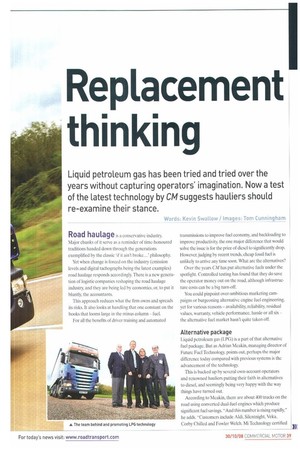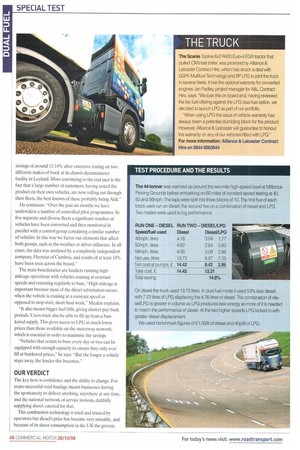Replacement thinking
Page 39

Page 40

Page 41

If you've noticed an error in this article please click here to report it so we can fix it.
Liquid petroleum gas has been tried and tried over the years without capturing operators' imagination. Now a test of the latest technology by CM suggests hauliers should re-examine their stance.
Words: Kevin Swallow / Images: Tom Cunningham Road haulage is a conservative industry Major chunks of it serve as a reminder of time-honoured traditions handed down through the generations exemplified by the classic if it ain't broke...' philosophy.
Yet when change is forced on the industry (emission levels and digital tachographs being the latest examples) road haulage responds accordingly There is a new generation of logistic companies reshaping the road haulage industry, and they are being led by economics, or, to put it bluntly, the accountants.
This approach reduces what the firm owns and spreads its risks. It also looks at handling that one constant on the books that looms large in the minus column fuel.
For all the benefits of driver training and automated transmissions to improve fuel economy, and backloading to improve productivity, the one major difference that would solve the issue is for the price of diesel to significantly drop. However, judging by recent trends, cheap fossil fuel is unlikely to arrive any time soon. What are the alternatives?
Over the years CM has put alternative fuels under the spotlight. Controlled testing has found that they do save the operator money out on the road, although infrastructure costs can be a big turn-off.
You could pinpoint over-ambitious marketing campaigns or burgeoning alternative engine fuel engineering, yet for various reasons availability, reliability, residual values, warranty, vehicle performance, hassle or all six the alternative fuel market hasn't quite taken off.
Alternative package
liquid petroleum gas (LPG) is a part of that alternative fuel package. But as Adrian Mealcin, managing director of Future Fuel Technology, points out, perhaps the major difference today compared with previous systems is the advancement of the technology.
This is backed up by several own-account operators and renowned hauliers putting their faith in alternatives to diesel, and seemingly being very happy with the way things have turned out.
According to Meakin, there are about 400 trucks on the road using converted dual-fuel engines which produce significant fuel savings. "And this number is rising rapidly," he adds. "Customers include Aldi, Silentnight, Veka, Corby Chilled and Fowler Welch. Mi Technology certified savings of around 12-14% after extensive testing on two different makes of truck at its chassis dynamometer facility in Leyland. More convincing to the end user is the fact that a large number of customers, having tested the product on their own vehicles, are now rolling out through their fleets, the best known of these probably being Aldi.'' He continues: -Over the past six months we have undertaken a number of controlled pilot programmes. In five separate and diverse fleets a significant number of vehicles have been converted and then monitored in parallel with a control group containing a similar number of vehicles. In this way we factor out elements that affect both groups, such as the weather or driver influence. In all cases, the data was analysed by a completely independent company. Fleetstat of Cumbria, and results of at least 10% have been seen across the board."
The main beneficiaries are hauliers running highmileage operations with vehicles cruising at constant speeds and returning regularly to base. "High mileage is important because most of the diesel substitution occurs when the vehicle is cruising at a constant speed as opposed to stop-start, short-haul work," Meakin explains.
"It also means bigger fuel bills, giving shorter pay-back periods. Users must also be able to fill up from a bunkered supply. This gives access to LPG at much lower prices than those available on the motorway network, which is essential in order to maximise the savings.
"Vehicles that return to base every day or two can be equipped with enough capacity to ensure they only ever fill at bunkered prices," he says. "But the longer a vehicle stays away. the harder this becomes."
OUR VERDICT
The key here is confidence and the ability to change. For years successful road haulage meant businesses having the spontaneity to deliver anything, anywhere at any time. and the national network of service stations, dutifully supplying diesel, catered for that.
This combustion technology is tried and trusted by operators but diesel's price has become very unstable, and because of its sheer consumption in the UK the govern ment isn't likely to give hauliers preferential treatment in terms of duty. But the nature of transport has changed and for the most part road haulage, or third-party logistics depending on which camp you sit in, has worked hard to replace spontaneity with routine; centralised pallet networks being the prime example.
Logistic companies now concentrate on defined retail and distribution outlets. Transport managers know the location and ETA of every truck, and that lends itself perfectly for operators looking to bring in an alternative fuel supply. They already have a solid, high-mileage, consistent working environment where the juice can be sourced from base, allowing each vehicle to go out and return using one full tank. A LPG is returned to gas Our test has provided an insight as to what an opera prior to injection into tion can save but, as Adrian Meakin points out, the the inlet manifold amount of LPG you will need, and the money you can save, is down to the specific workings of your operation.
CM'S 60-mile constant speed test provided evidence of a 14.6% cost saving, vehicle performance wasn't impeded and the driveline after conversion has a warranty. There is no reason why operators' trust in diesel can't be replicated in LPG, and you could save a few quid on the way. •




































































































































































